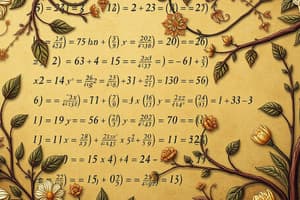Podcast
Questions and Answers
If f(x) is a third degree polynomial function, how many distinct complex roots are possible?
If f(x) is a third degree polynomial function, how many distinct complex roots are possible?
0 or 2
According to the Fundamental Theorem of Algebra, which polynomial function has exactly 6 roots?
According to the Fundamental Theorem of Algebra, which polynomial function has exactly 6 roots?
- f(x)=3x^7+x^2
- f(x)=7x^6+3x^3+12 (correct)
- f(x)=x^5 + x^4 + x^3
- f(x)=2x^4 + x^2 + 1
According to the Fundamental Theorem of Algebra, how many roots exist for the polynomial function f(x) = 8x^7 - x^5 + x^3 + 6?
According to the Fundamental Theorem of Algebra, how many roots exist for the polynomial function f(x) = 8x^7 - x^5 + x^3 + 6?
7 roots
If 9i is a root of the polynomial function f(x), which of the following must also be a root of f(x)?
If 9i is a root of the polynomial function f(x), which of the following must also be a root of f(x)?
According to the Fundamental Theorem of Algebra, how many roots exist for the polynomial function f(x) = 4x^5 - 3x?
According to the Fundamental Theorem of Algebra, how many roots exist for the polynomial function f(x) = 4x^5 - 3x?
Two roots of a third degree polynomial function f(x) are -4 and 4. Which statement describes the number and nature of all roots for this function?
Two roots of a third degree polynomial function f(x) are -4 and 4. Which statement describes the number and nature of all roots for this function?
If -3 + i is a root of the polynomial function f(x), which of the following must also be a root of f(x)?
If -3 + i is a root of the polynomial function f(x), which of the following must also be a root of f(x)?
According to the Fundamental Theorem of Algebra, how many roots exist for the polynomial function (9x + 7)(4x + 1)(3x + 4) = 0?
According to the Fundamental Theorem of Algebra, how many roots exist for the polynomial function (9x + 7)(4x + 1)(3x + 4) = 0?
According to the Fundamental Theorem of Algebra, which polynomial function has exactly 11 roots?
According to the Fundamental Theorem of Algebra, which polynomial function has exactly 11 roots?
Flashcards are hidden until you start studying
Study Notes
Fundamental Theorem of Algebra Overview
- Every polynomial function of degree n has exactly n roots, counting multiplicities, in the complex number system.
- Complex roots appear in conjugate pairs; therefore, if one complex number is a root, its conjugate is also a root.
Root Characteristics
- A third degree polynomial can have 1, 2, or 3 real roots.
- If 9i is a root of a polynomial, -9i must also be a root due to conjugate pair rule.
- If -3 + i is a root, then -3 - i must also be a root.
Polynomial Examples and Roots
- The polynomial function (f(x) = 7x^6 + 3x^3 + 12) has exactly 6 roots.
- The polynomial (f(x) = 8x^7 - x^5 + x^3 + 6) has a total of 7 roots.
- For the polynomial (f(x) = 4x^5 - 3x), the total number of roots is 5.
- The product ((9x + 7)(4x + 1)(3x + 4) = 0) results in exactly 3 roots.
Example with Roots
- A third degree polynomial having roots -4 and 4 indicates that it has 3 real roots total.
Advanced Polynomial Functions
- The polynomial (f(x) = (2+x)^3(x^2 - 7x + 3)^4) produces 11 roots, considering the multiplicities.
Studying That Suits You
Use AI to generate personalized quizzes and flashcards to suit your learning preferences.




